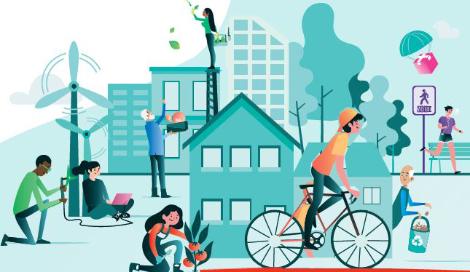01 Transforming my territory with the inhabitants
Governance
November 2019
Agence pour l’Environnement et la Maîtrise de l’Energie (ADEME)
The 20 factsheets in the collection « demain MON TERRITOIRE » have been designed to give candidates and elected officials practical keys to take action, to open up the field of possibilities based on the experiences of other elected officials, from small towns to conurbations, large urban areas or sparsely populated areas. In the four corners of France, both in metropolitan France and in the French Overseas Territories, many of them are taking action, together with the players in their territories, to prepare for the future by taking action to mitigate climate change and adapt to its effects. With its knowledge and presence throughout the country, ADEME supports them with its tools, activities and financial aid.

Why is mobilizing citizens and elected officials important for the ecological transition?
On the one hand, the French are thirsty for democracy and want to be more involved in the decisions that affect them on a daily basis. On the other hand, the fight against global warming involves such changes in our lifestyles that it is impossible to make this transition without the support of the greatest number and a strong mobilization of elected officials. The way of governing the city must therefore change. Whether it is a question of urban development, mobility, waste management or energy, the cooperation of the inhabitants makes it possible to invent new responses to complex problems, to smooth out local conflicts over infrastructure projects and to better meet the aspirations of all. Citizen participation is a pragmatic and enthusiastic way to better build the city of tomorrow, alongside committed elected officials.
How do you do it?
-
The ecological transition needs to be taken to the highest level. The climate strategy, for example, is entrusted to the first deputy. Elected representatives in charge of housing, transport, energy, economic development, waste and green spaces work together in a special committee. The key word: transversality!
-
Transparency is being promoted by strengthening communication on the city council’s work on sustainable development, the choices considered and the results achieved.
-
The expertise of citizens is used to develop projects rooted in reality, through consultation and cooperation. Residents express themselves in public meetings or through questionnaires. The formulas are adapted so that everyone can take part: young or old, working or retired, well-off or precarious households. Participatory workshops are organized in the neighbourhoods, whose members are drawn by lot, for example.
-
Initiatives from the field are encouraged by giving more representation and resources to neighbourhood councils, youth councils, citizen juries, etc. We are moving towards a participatory budget that gives residents a say in the allocation of a share of municipal funds. Mixed commissions bring together inhabitants, local associations, elected officials in charge of files and technical service agents to co-construct projects.
-
Elected officials and municipal staff are trained to work collegially with citizens.